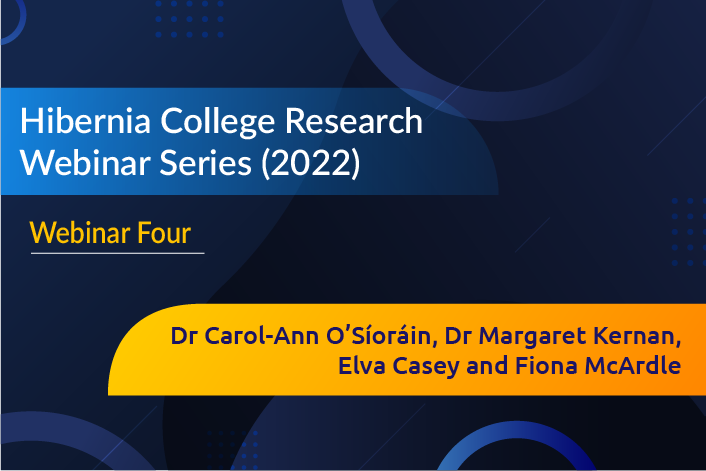
The 2022 Research Webinar Series continued with a presentation on 29 June, featuring researchers Dr Carol-Ann O’Síoráin, Dr Margaret Kernan, Elva Casey and Fíona McArdle from the Hibernia College School of Education. The webinar was titled A social justice lens on play and playful learning in Infant classrooms: ‘disrupting’ the Aistear Hour. Attendees were invited to critically reflect on playful learning as a tool to create space for children’s voices and experiences in the Infant classroom.
Value of Play
The value of play cannot be underestimated. Play naturally draws self-identity and self-expression from a child as the child’s own voice emerges. It enables children to recreate and rehearse their personal life experiences and cultivate their place in their family and community. Given these and other essential outcomes, the researchers call for a conscious ‘pause to reflect’ on the play-based events called the ‘Aistear Hour’ in mainstream primary Infant classrooms.
Play as Social Justice
As adults in a challenging world, we are reconceptualising and revalidating our theories and ideologies of childhood. The central question of this webinar was: How can we change and adapt our practices to be more responsive and inclusive of the child’s voice in our schools?
The webinar sought to engage attendees in a process of critical reflection on play and pedagogy through a social justice lens. The researchers were delighted by attendees’ contributions to the webinar and believe the professional conversations that took place can begin to ‘disrupt’ and transform dominant pedagogical practices. With hope, these changes can make more space for the voice of the child and their experiences through play in the Infant classroom.
Research Team
Dr Carol-Ann O’Síoráin is a Lecturer in Education in the School of Education. Carol-Ann’s research interests are in the areas of special and inclusive pedagogy, supporting learners with intellectual disabilities, the voice and role of parents in education, and the role of play and playfulness in advancing communication and access to learning.
Dr Margaret Kernan is a Lecturer in Education in the School of Education. Before her appointment with Hibernia College, Margaret was a Senior Programme Manager at International Child Development Initiatives (ICDI) in The Netherlands, an international knowledge organisation focused on children growing up in difficult circumstances. While at ICDI, Margaret led multi-partner research, training and development projects about the psychosocial wellbeing of children, play and learning, children’s rights, diversity and inclusion. Since 2012, she has also led the award-winning intergenerational learning programme Together Old and Young (TOY).
Elva Casey is the Acting Programme Director of the Professional Master of Education (PME) in Primary Education. Elva has worked for over 12 years as a qualified primary school teacher. She has extensive experience teaching at all class levels. She also has significant experience working in special needs education and has undertaken further professional development studies in supporting children with autism and behavioural and emotional needs, teaching Infants and implementing the Aistear Framework.
Fíona McArdle is a Lecturer in Education in the School of Education. Before joining Hibernia College, she worked as a primary school principal. With over 14 years’ experience in primary school teaching and leadership, both in Ireland and the Middle East, Fíona has taught in single stream, multigrade, special educational needs (SENs), international and Gaelscoileanna classes.
This webinar was part of a series of research-focused webinars hosted by Dr Carol-Ann O’Síoráin, Dr Jean Henefer and Irene O’Dowd for Hibernia College students and faculty who are exploring research in the field of education — particularly, the importance of research in the contemporary classroom. Read more about the previous Research Webinar Series presentation.